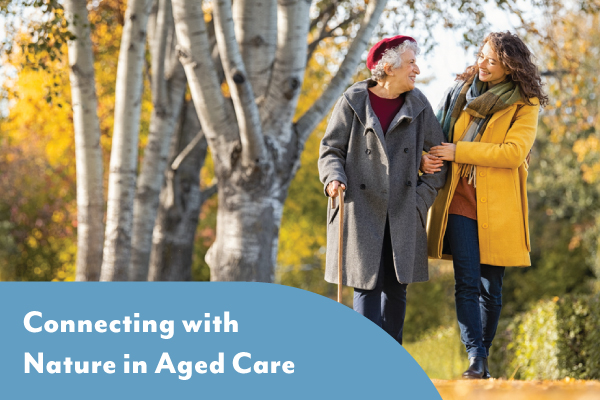For many aged care residents, aged care workers – either in residential care or home care – may be the only people they have seen in quite some time. Unfortunately, there are many elderly people who are not visited by family or friends, or perhaps do not have family and friends to visit them.

The efforts trying to protect our elderly community during the global pandemic have contributed to them being cut off from the outside world to varying degrees. Even at the best of times loneliness is a concern for ageing individuals. There are many elderly people who are not visited by family or friends, or perhaps do not have family and friends to visit them. As well as missing out on visits, many lifestyle activities and outings have been removed from programs, adding to that sense of disengagement.
As people across the world take all necessary precautions to protect the elderly people in their lives who are more vulnerable, it’s also important to assess ways families can stay connected to older individuals and vice versa.
Access the benefits of connection
As human beings, staying connected with other people and the world around us doesn’t just feel great but has health benefits too.
Being a part of a community and having a sense of belonging can offer:
- Improved immune system
- Higher levels of happiness
- Improved memory
- Increase cognitive ability
- Lower stress levels
- Reduced incidence of many health conditions
- Strong self-esteem
- Longer life
There have been many developments and experiments to see what’s possible for connecting safely with elderly family members through the pandemic. Some fresh innovation has been popping up throughout the sector, including a shipping container safe visitation pod here in Australia. As always, advancing technology has played a role too — virtual reality headsets have been utilised to give elderly individuals the chance to be transported to destinations and activities of their dreams. Snorkelling or hot air ballooning, anyone?!
Five quick tips to support aged care connections
To help you keep elderly residents feeling connected with their communities and families, these quick tips are easy to introduce and can help you make a notable difference:
Find ways to connect:
Phone calls, video calls, emails, letter writing, artwork sharing, gift exchanges — there are truly countless ways to stay connected even when in-person visitation isn’t possible. Make sure the elderly people in your care and their families are aware of all the different options available to them as some may simply not have thought of or found the right option for them.
Share life experiences:
Sometimes knowing what to say can be challenging. In person, conversation might flow, but perhaps not so much with means of communication that are less frequently used. Encourage families and residents to share the joy in things they are doing and experiencing. This might include art projects, gardening ventures and more — share progress and results to get everyone feeling involved.
Partner with the local community:
If families and friends are not forthcoming with staying connected to those living in aged care, reach out further. Local schools and kindergartens are often keen to get involved and can match children and older individuals as penpals. Also consider reaching out to local community groups who would likely be happy to be involved.
Take an individualised approach:
Supporting connection and communication for your aged care residents won’t be one size fits all. Look for signs of discomfort or enjoyment to assess what is working and what isn’t. Simply asking and discussing options with a person is a good place to start to find out how you can better support their engagement with the world.
Support connection efforts:
Let those in your care know that you can help them access the necessary resources to stay connected. It might be a piece of paper and a pen, followed by an envelope and stamp. Maybe they need help with the physical writing or typing. Check in to make sure they have the means to stay in touch with the world around them.
The vital role of aged care workers
Part of the work of a quality aged care worker is in being an attentive companion to the elderly. Many aged care residents value their carers as friends. Don’t underestimate the power you have to make those in your care feel connected, valued and seen.
The little things count — making eye contact, asking questions and showing interest in the response, sharing information about what’s happening in the world and approaching your work with genuine compassion.
For support with your aged care training, we would love to hear from you — get in touch with Selmar.



